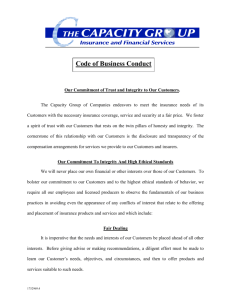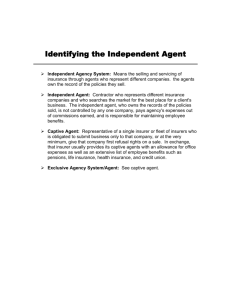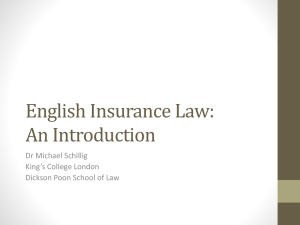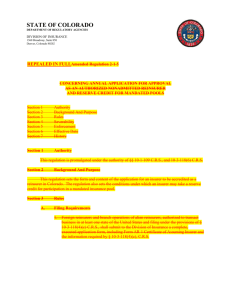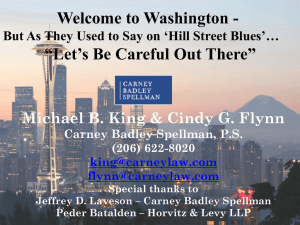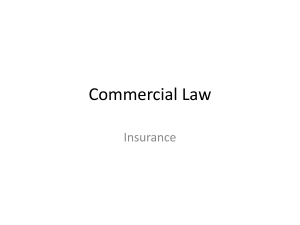Tips To Adjusters For Avoiding Bad Faith Claims
advertisement
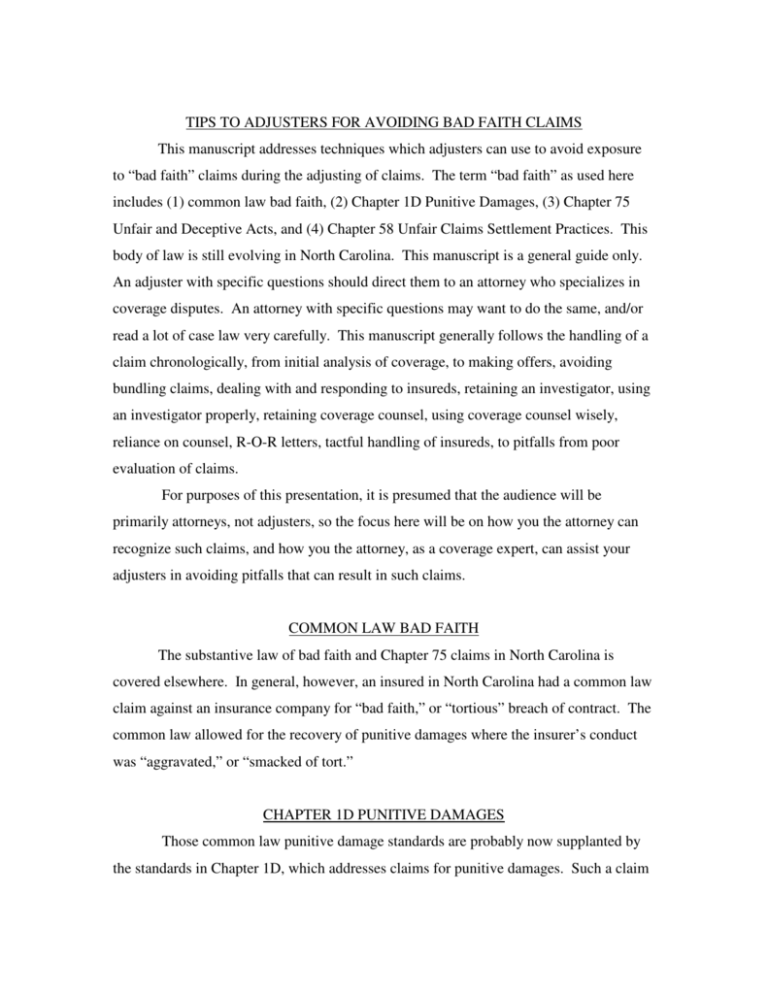
TIPS TO ADJUSTERS FOR AVOIDING BAD FAITH CLAIMS This manuscript addresses techniques which adjusters can use to avoid exposure to “bad faith” claims during the adjusting of claims. The term “bad faith” as used here includes (1) common law bad faith, (2) Chapter 1D Punitive Damages, (3) Chapter 75 Unfair and Deceptive Acts, and (4) Chapter 58 Unfair Claims Settlement Practices. This body of law is still evolving in North Carolina. This manuscript is a general guide only. An adjuster with specific questions should direct them to an attorney who specializes in coverage disputes. An attorney with specific questions may want to do the same, and/or read a lot of case law very carefully. This manuscript generally follows the handling of a claim chronologically, from initial analysis of coverage, to making offers, avoiding bundling claims, dealing with and responding to insureds, retaining an investigator, using an investigator properly, retaining coverage counsel, using coverage counsel wisely, reliance on counsel, R-O-R letters, tactful handling of insureds, to pitfalls from poor evaluation of claims. For purposes of this presentation, it is presumed that the audience will be primarily attorneys, not adjusters, so the focus here will be on how you the attorney can recognize such claims, and how you the attorney, as a coverage expert, can assist your adjusters in avoiding pitfalls that can result in such claims. COMMON LAW BAD FAITH The substantive law of bad faith and Chapter 75 claims in North Carolina is covered elsewhere. In general, however, an insured in North Carolina had a common law claim against an insurance company for “bad faith,” or “tortious” breach of contract. The common law allowed for the recovery of punitive damages where the insurer’s conduct was “aggravated,” or “smacked of tort.” CHAPTER 1D PUNITIVE DAMAGES Those common law punitive damage standards are probably now supplanted by the standards in Chapter 1D, which addresses claims for punitive damages. Such a claim requires fraud, malice, or willful or wanton conduct. G.S. § 1D-15(a). “Willful or wanton” means “conscious and intentional disregard of and indifference to the rights and safety of others, which the defendant knows or should know is reasonably likely to result in injury, damage, or other harm. “Willful or wanton conduct” is more aggravated than “gross negligence.” G.S. § 1D-5(7). The punitive damages statute does not address “bad faith” specifically. It does not enumerate exactly what conduct will constitute willful and wanton conduct, to satisfy the requirements of Chapter 1D for the recovery of punitive damages. Following the enactment of the statutory basis for punitive damages, it is not entirely clear whether the cases decided pursuant to the common law, prior to the enactment of Chapter 1D, still have application to “bad faith” claims or punitive damages claims generally, against an insurer. Presumably, however, those cases will have some significant bearing on future rulings as to whether a given activity constitutes a basis for punitive damages. CHAPTER 75 UNFAIR AND DECEPTIVE ACTS In addition to the G.S. § IB-1 claim for punitive damages, the insured also may have a claim for a violation of Chapter 75, based on conduct of the insurer which is “unfair” or “deceptive.” “[A] practice is deceptive if it has the tendency to deceive. . . . ‘[a] practice is unfair when it offends established public policy as well as when the practice is immoral, unethical, oppressive, unscrupulous, or substantially injurious to consumers.’” Gray v. North Carolina Ins. Underwriting Ass'n, 352 N.C. 61, 68 (2000). Although Chapter 75 is likewise vague as to the specific activities which will constitute “unfair or deceptive” acts, which will subject the insurer to treble damages and attorney’s fees under Chapter 75, some generalizations can be drawn from the existing appellate cases, and statutes providing guidance as to the conduct which an insurer must follow in handling a claim. In the 2005 case of Craven v. Semidovich, 172 N.C. App. 340, 341, 615 S.E.2d 722, 723 (N.C. App. 2005) a third party plaintiff refused GEICO’s offer to settle a motor vehicle personal injury claim and sued the insurer, complaining that another passenger’s McDANIEL & ANDERSON, L.L.P. 2 Raleigh, North Carolina claim had been settled. The Court followed Wilson v. Wilson, 171 N.C. App. 662, 665, 468 S.E.2d 495, 497 (1996) which held that there was no third party claim. It distinguished Murray v. Nationwide Mutual Ins. Co., 123 N.C. App. 1, 472 S.E.2d 358 (1996), and Lavender v. State Farm Mut. Auto. Ins. Co., N.C. App. 135, 136, 450 S.E.2d 34, 35 (1994), where the third-party plaintiff had already obtained a judgment against the insured before filing suit against the insurer. See also Hall v. Harleysville Mut. Casualty Co., 233 N.C. 339, 64 S.E.2d 160 (1951). Most claims of bad faith involve an allegation that the claim was wrongfully denied; i.e. that the insurer wrongfully refused to pay anything, or that the payment was insufficient. It is useful to distinguish between bad faith in the denial of coverage for a claim, as opposed to bad faith in the manner in which the claim is handled. The primary issue in “coverage” cases is whether the insurer had a reasonable position on coverage, even if that position is later determined to be erroneous. CHAPTER 58-63 UNFAIR TRADE PRACTICES G.S. §58-63-15(11) sets forth a list of “Unfair Claim Settlement Practices” which is the basis of many claims against insurers. A number of them are discussed below. Similar to its holding as to a Chapter 75 claim, Wilson v. Wilson also held that a third party plaintiff cannot assert Chapter 58 claims against the insurer of an adverse party. An insured may, however. TIP # 1: AVOID A STRAINED OR FANCIFUL POLICY INTERPRETATION In Olive v. Great American Ins. Co., 76 N.C. App. 180, 189 (1985), the Court held that the insured did not have a claim for bad faith where his “claim was clearly the basis of an honest disagreement between the parties . . . [and insurer] denied plaintiffs' insurance claim based on an interpretation that is neither strained nor fanciful, regardless of whether it is correct.”). The adjuster should therefore obviously not deny a claim under a strained reading of the policy or the facts. McDANIEL & ANDERSON, L.L.P. 3 Raleigh, North Carolina TIP # 2: DON’T MAKE AN UNREASONABLY LOWBALL OFFER G.S. § 8-63-15(11)(h) provides that “Attempting to settle a claim for less than the amount to which a reasonable man would have believed he was entitled.”) Similarly, where the extent of the covered loss is clear, versus some portion of the loss which is not covered, the adjuster should pay that amount which is clearly covered. TIP # 3: DON’T FORCE THE INSURED TO SUE BY MAKING A LOWBALL OFFER G.S. § 68-63-15(11)(g) provides that an insurer commits unfair/deceptive act by “Compelling [the] insured to institute litigation to recover amounts due under an insurance policy by offering substantially less than the amounts ultimately recovered in actions brought by such insured.” TIP # 4: DON’T BUNDLE CLAIMS One major area of exposure for bad faith against an adjuster is “bundling” the claim, i.e., if the adjuster refuses to pay a legitimate claim until the entire claim is resolved, that action may be perceived as bad faith conduct. See also G.S. § 58-6315(11)(m) which provides that an insurer commits unfair and deceptive acts by “Failing to promptly settle claims where liability has become reasonably clear, under one portion of the insurance policy coverage in order to influence settlements under other portions of the insurance policy coverage.” See PHC, Inc. v. North Carolina Farm Bureau Mut. Ins. Co., 129 N.C. App. 801, 806, 501 S.E.2d 701, 704 (1998) (“defendant's refusal to pay at least the undisputed amount of loss to plaintiff was unwarranted, and the trial court properly awarded attorneys' fees pursuant to N.C. Gen. Stat. § 6-21.1.”) If the adjuster is required, by law or by the policy, to provide the insured certain forms (such as a proof of loss form), then he or she should do so as promptly as feasible, and certainly within any required period. McDANIEL & ANDERSON, L.L.P. 4 Raleigh, North Carolina TIP # 5: RESPOND TO INSURED’S INQUIRIES The adjuster should generally respond to all inquiries from the insured, whether by letter or telephone call or otherwise. A major area of exposure for bad faith is when the insurer simply fails to respond, or to respond in a timely fashion, to the insured’s demands and inquiries. See G.S. § 58-63-15(11)(b) (insurer commits unfair/deceptive acts by “Failing to acknowledge and act reasonably promptly upon communications with respect to claims arising under insurance policies”). G.S. § 58-63-15(11)(c) (“Not attempting in good faith to effectuate prompt, fair and equitable settlements of claims in which liability has become reasonably clear”), G.S. § 58-63-15(11)(n) (“Failing to promptly provide a reasonable explanation of the basis in the insurance policy in relation to the facts or applicable law for denial of a claim or for the offer of a compromise settlement”). The adjuster should generally have some plan for responding to the insured’s demand for coverage. This plan may entail obtaining additional information from the insured, obtaining information from third parties, retaining experts or retaining legal counsel for a legal opinion, or discussing the case internally. The insurer should notify the insured that it is investigating the claim, and should generally keep the insured advised as to the status of the handling of the claim. TIP # 6: DON’T MISREPRESENT YOUR POSITION The insurer must be careful, however, when informing the insured of the status of its investigation. The insurer must not make dishonest representations about its investigation. Where, for example, the adjuster notified the insured that it was still investigating the claim and whether to accept or deny coverage and a defense, but in fact the insurer had already decided to deny coverage, that was held to be evidence of a violation of Chapter 75 (i.e., an unfair or deceptive act.) Country Club of Johnston County, Inc. v. United States Fidelity & Guar. Co., 150 N.C. App. 231, 236, 563 S.E.2d 269, 273 (2002) (affirming Chapter 75 award where jury found that “USF & G McDANIEL & ANDERSON, L.L.P. 5 Raleigh, North Carolina misrepresent[ed] that it was investigating the application of Exclusion C when USF & G had determined that it was going to deny coverage.”) TIP # 7: DON’T DENY A CLAIM WITHOUT INVESTIGATING IT Prior to denying the insured’s claim, the insurer generally has a duty to investigate the claim. Pursuant to Chapter 58, the insurer may not “Fail[]to adopt and implement reasonable standards for the prompt investigation of claims arising under insurance policies” and “Refus[e] to pay claims without conducting a reasonable investigation based upon all available information.” See G.S. § 58-63-15(11)(c), (d). Thus, the insurer may not simply place the entire burden of establishing the claim on the insured. The adjuster’s investigation may include interviewing the insured, interviewing witnesses, visiting the site of the loss, examining photographs and other reports, and using experts and attorneys for guidance and input. Where the adjuster denies a claim, he or she should always invite the insured to submit any additional documentation or evidence relevant to the claim. This tends to make a favorable “paper trail.” If the insured does provide additional information, then of course you should review that additional information; the adjuster’s promise to review additional information should not be hollow. Most claims denials are based on a factual determination, as opposed to being based on a pure coverage issue. The insurer may, for example, disagree with the insured’s valuation of his property. In the case of a fire loss, the insurer may also suspect arson. And in a “med pay” claim, the insurer may question the reasonableness or causation of medical treatment. TIP # 8: RETAIN AND USE AN EXPERT CAREFULLY In cases involving factual disputes, the insurer’s investigation should often include the use of an outside expert. This may be, for example, a professional appraiser, a fire investigator, or a healthcare professional. The use of and reliance on an expert consultant can be strong evidence to defend against an allegation of bad faith. However, McDANIEL & ANDERSON, L.L.P. 6 Raleigh, North Carolina it would be stretching it to say that reliance on an expert guarantees insulation from a bad faith claim. (North Carolina has not had any appellate opinions which squarely address the issue of whether the adjuster’s reliance on an expert insulates the carrier from a finding of bad faith.) Other jurisdictions have struggled with the issue of an adjuster’s reliance on an outside expert. Such reliance is admissible to challenge an allegation of bad faith. In a few cases, the reliance on an expert was held sufficient to defeat a claim for bad faith as a matter of law. In most cases, however, the courts hold that the insurer’s bad faith is still a question for the jury. Those courts hold that reliance on the expert is only one of many considerations in determining the insurer’s bad faith. As stated by one court: [W]e have never held that the mere fact that an insurer relies upon an expert's report to deny a claim automatically forecloses bad faith recovery as a matter of law. Instead, we have repeatedly acknowledged that an insurer's reliance upon an expert's report, standing alone, will not necessarily shield the carrier if there is evidence that the report was not objectively prepared or the insurer's reliance on the report was unreasonable. State Farm Lloyds v. Nicolau, 951 S.W.2d 444, 448 (Tex. 1997). The expert must, of course, have suitable qualifications. In one case in North Carolina, the insurer was adjusting a fire loss, and hired someone to estimate the cost of rebuilding the structure. That person was not, however, a licensed general contractor. The Court held that the use of an unqualified person as an expert was evidence of bad faith. Dailey v. Integon General Ins. Corp., 75 N.C. App. 387, 396, 331 S.E.2d 148, 155 (1985) (“defendant had an unlicensed builder, whose lack of qualifications to do the work were not checked, to examine the house, and it was a month after that before defendant offered to settle the claim based on that builder's estimate, which was grossly inadequate”). Another common issue in bad faith cases in which the insurer relies on an expert is the extent to which that insurer routinely employs that particular expert. Most cases hold that in general, the repeated use of the same expert tends to undercut the insurer’s McDANIEL & ANDERSON, L.L.P. 7 Raleigh, North Carolina ability to rely on that expert. One case held that the mere use of the same expert in numerous cases is not, of itself, bad faith. McManus v. State Farm Lloyds, 2004 WL 2533558, 4 (N.D. Tex. 2004) (“the evidence that Perdue receives substantial revenues from State Farm is not sufficient to raise a genuine issue of material fact whether State Farm acted reasonably in denying McManus' claim. State Farm is entitled to judgment as a matter of law on McManus' bad faith claim.”). In that case, the bad faith claim was that the carrier hired a biased engineer to investigate the claims, whom it knew would look after its interests. In McManus v. State Farm Lloyds, 2004 WL 2533558, 4 (N.D. Tex. 2004) the court held: “...the evidence that Perdue receives substantial revenues from State Farm is not sufficient to raise a genuine issue of material fact whether State Farm acted reasonably in denying McManus' claim. State Farm is entitled to judgment as a matter of law on McManus' bad faith claim.” As noted earlier, the adjuster and the insurer are not immune from a bad faith lawsuit simply because they sought and relied upon an expert opinion. Their reliance on the expert opinion is still examined in light of all of the circumstances. For that reason, the adjuster should use the opinions with care, supplement the inquiry as additional information becomes available, and the adjuster should carefully review the expert’s reports, prior to relying on its conclusions. If the contents of the report are questionable, such as containing an incorrect factual assertion or containing poor reasoning, then the adjuster should seek clarification. TIP # 9: DON’T WITHHOLD INFORMATION FROM YOUR EXPERT In using and relying on an outside expert, the adjuster should take certain precautions. The adjuster should provide the expert with all of the relevant information in the file pertaining to the insured’s claim. If the adjuster withholds information which should have been given to the expert, then the reliance on the expert may not only be rejected, but may be viewed as evidence of bad faith. There is no N.C. case on point. McDANIEL & ANDERSON, L.L.P. 8 Raleigh, North Carolina Moore v. American United Life Ins. Co., 150 Cal. App. 3d 610, 640 (1984) held as follows: “Since defendant's claims practices were designed to obtain misleading opinions from treating physicians, the fact that defendant had no opinion indicating plaintiff was totally disabled is immaterial.” TIP # 10: AVOID TAINTING THE EXPERT’S CONCLUSION When using an expert, the adjuster must also be careful to not suggest the conclusion that the insurer wants. The act of relying on a consultant during the claim adjusting stage may be viewed differently from the use of an “advocacy” expert by the defense during trial prep and trial. At least one case has suggested that the expert consultant at this stage should truly be unbiased. In one case, a federal court held that as a matter of law the insurer could not rely on the opinion of a tainted consultant. Atiyeh v. Liberty Mut. Fire Ins. Co., 185 F. Supp. 2d 436, 438 (E.D. Pa. 2002). In that case, the adjuster sent medical records to an expert to review, in connection with a med-pay claim. With these medical records, the adjuster sent a notation stating the following: “Claimant is not working. Address return to work issues. Restrictions. Anticipated duration of any restrictions. Timeframes for reasonable full and partial disability status. Please see enclosed pictures of claimant's car depicting very minimal damage! Claimant has been out on disability for 9 months now! ....” The Court held as follows: “Plaintiff has demonstrated that a genuine issue of material fact exists as to whether the IME was a reasonable basis for Defendant to discontinue Plaintiff's wage loss benefits, because Dr. Lipson may have been unduly influenced by the statements on the Concentra referral letter. In light of the fact that Ms. Koval apparently received a copy of the allegedly suggestive letter, there is also a genuine issue of material fact as to whether Defendant knew or recklessly disregarded the risk that the IME did not constitute a reasonable basis for Defendant's decision.” The adjuster should also supplement the inquiry with the expert as additional information regarding the claim is developed. The adjuster should carefully review the expert’s reports, prior to relying on its conclusions. If the contents of the report are questionable, such as containing an incorrect McDANIEL & ANDERSON, L.L.P. 9 Raleigh, North Carolina factual assertion or containing poor reasoning, then the adjuster should seek clarification. As noted earlier, the adjuster and the insurer are not immune from a bad faith lawsuit simply because they sought and relied upon an expert opinion. Their reliance on the expert opinion is still examined in light of all of the circumstances. In a fairly recent North Carolina case, Nelson v. Hartford Underwriters Ins. Co., 177 N.C. App. 595, 609, 630 S.E.2d 221, 177 N.C. App. 595, 699, 630 S.E.2d 221, 231 (2006), the insurer denied a mold claim where the investigator found no water leaks. The Court rejected claims that the insurer (1) misrepresented its policy (GS § 58-6315(11)(a)), or (2) failed to provide a reasonable explanation (GS § 58-63-15(11)(n), denying coverage based on less than all the possible grounds, including events occurring before the effective date of the policy, where the letter expressly reserved the right to assert other defenses. The Court similarly rejected claims that the insurer (1) failed to adopt reasonable standards for investigation of claims (GS § 58-63-15(11)(c), (2) failed to conduct a reasonable investigation (GS § 58-63-15(11)(d) where the investigation report did not include an analysis of the type of mold, or (3) failed to affirm or deny coverage within a reasonable time (GS § 58-63-15(11)(e). The Court also rejected a claim that the insurer’s actions slowed the remediation of the home. The Court noted that “...those actions only slowed the response to the injury, and did not cause the injury itself.” In another 2006 case, an independent adjuster investigated a stucco claim and insisted that the homeowner allow the insured to perform the re-clad, assuring that it would “do a good job.” The re-clad failed. In Koch v. Bell, Lewis & Associates, Inc., 176 N.C. App. 736, 627 S.E.2d 636 (2006), the Court held that the adjuster could not be sued in negligence for the damage to the plaintiff, or as a Chapter75 claim, citing Wilson v. Wilson, 171 N.C. App. 662, 665, 468 S.E.2d 495, 497 (1996). The Court also affirmed dismissal of a claim against the insurer, based on the language of the release which released “...claims against any and all other persons, firms and corporations, whether herein named or not, and any and all past, present and future actions, causes of action, claims, demands, damages...” McDANIEL & ANDERSON, L.L.P. 10 Raleigh, North Carolina TIP # 11: MAKE REASONABLE USE OF COVERAGE COUNSEL The insurance claim may sometimes raise a pure coverage issue, as distinct from a factual issue. In such event, the adjuster may want to seek the advice of legal counsel regarding the coverage issue presented. North Carolina does not have any cases addressing the significance of the insurer’s reliance on the advice of independent counsel when denying a claim. The cases from other jurisdictions generally hold that the reliance on the advice of independent counsel is evidence that the insurer acted in good faith. “An insurer may defend itself against allegations of bad faith and malice in claims handling with evidence the insurer relied on the advice of competent counsel. The defense of advice of counsel is offered to show the insurer had ‘proper cause’ for its actions even if the advice it received is ultimately unsound or erroneous.” State Farm Mut. Auto. Ins. Co. v. Superior Court, 228 Cal. App. 3d 721, 725, 279 Cal. Rptr. 116, 117-18 (1991). A case arising in a non-insurance context held that reliance on counsel is not an absolute defense where the advice is contrary to settled law. See generally Culp v. Stanford, 16 S.E. 761, 761 (N.C. 1893) (“It is doubtful, to say the least, if the advice of counsel could be a defense where the law in favor of the ward's right to the fund had been so clearly settled by the authorities.”). In one case, the court suggested that the insurer’s retention of counsel for a legal opinion, after the insurer had already decided to deny coverage, was actually evidence of bad faith. Country Club of Johnston County, Inc. v. United States Fidelity & Guar. Co., 150 N.C. App. 231, 236, 563 S.E.2d 269, 273 (2002) (affirming Chapter 75 violation where jury found “USF & G solicit[ed] an opinion letter from counsel after having already made a decision to deny coverage.”). Even when it has counsel’s opinion in hand, the insurer must still act reasonably. In Allen v. Allstate Ins. Co., 656 F.2d 487, 489 (9th Cir. 1981), the defense attorney opined that the jury would find that the plaintiff-passenger assumed the risk of injury by riding with an intoxicated driver. The insurer’s McDANIEL & ANDERSON, L.L.P. 11 Raleigh, North Carolina district manager, however, estimated chances of losing at trial between 40% and 60%, “and that a judgment of $500,000, or five times Allstate's policy limit, might be entered.” Where “Allstate nevertheless chose to rely on its attorney's assertion that Allstate's case was a ‘100% winner’ ... jury would be permitted to find that Allstate's reliance on the advice of its attorney was the result of wishful thinking rather than a good faith balancing of its own and its insured's interests.” For a similar outcome, see Zimmerman v. Harleysville Mut. Ins. Co., 860 A.2d 167,172 (Pa. Super. 2004) rejecting the argument that “the law was complex and the insurer consistently relied on the advice of respected counsel.”) One court expressed the limitations on the defense of “advice of counsel” as follows: . . . it is simply not enough for the carrier to say it relied on advice of counsel, however unfounded, and then expect that valid claims for coverage can be denied with impunity pursuant to such advice. The advice of counsel is but one factor to be considered in deciding whether the carrier's reason for denying a claim was arguably reasonable. We believe that where, through verbal sleight of hand, the advising attorney concocts an imagined loophole in a policy whose plain language extends coverage, such advice is heeded at the carrier's risk. Szumigala v. Nationwide Mut. Ins. Co., 853 F.2d 274, 282 (5th Cir. 1988). To aid in use of the defense, the adjuster must provide the attorney with all relevant and all requested information, and must not suggest that a particular conclusion is desired. TIP # 12: EXPECT DISCLOSURE OF CONFIDENTIAL COMMUNICATIONS FROM COVERGE COUNSEL The adjuster should also be aware that if the insurer relies on the defense of “advice of counsel,” that all communications to and from the attorney are probably subject to discovery. North Carolina does not have much authority on this issue. In Evans v. United Services Auto. Ass'n, 142 N.C. App. 18, 32, 541 S.E.2d 782, 791 (2001), McDANIEL & ANDERSON, L.L.P. 12 Raleigh, North Carolina the trial court required disclosure and the appellate court affirmed. The Court of Appeals stated: Here, it appears that the twenty-one diary entries found by the trial court to be protected by the attorney-client privilege were either requests to counsel for advice and opinions, or were counsel's reply to such requests. Upon careful review of the record, we find no evidence that the trial court abused its discretion when it ordered the partial production and partial protection of the claims diary entries. See also Ring v. Commercial Union Ins. Co., 159 F.R.D. 653, 658 (M.D.N.C. 1995) (court declined to order disclosure where the advice of counsel defense was not used; “Thus, the Court finds that plaintiff has failed to make a sufficient showing of bad faith to obtain defendants' work product in their claims file, much less the opinion work product. It is noted that defendants have not relied on advice of counsel as a defense which might cause the Court to reconsider its position.”). Where the insurer does not rely on counsel’s advice, there are cases both ways. Counsel’s communications were held not discoverable in Aetna Cas. v. Pietrzak, 153 Cal. App. 3d 467, 475 (1984). “Aetna is not saying that their conduct was reasonable because their counsel opined so, but rather that their conduct was reasonable because the facts indicated that no valid claim existed... Aetna claims it acted as it did not because it was advised to do so, but because the advice was, in its view, correct.” “Such a defense does not waive the attorney-client privilege.” But see State Farm v. Lee, 13 P.3d 1169 (Ariz. 2000), finding a waiver even where the insurer did not rely on the advice. TIP # 13: BE CAREFUL SENDING YOUR R-O-R LETTER The adjuster should generally send a reservation of rights letter, where the failure to do so may result in a waiver of a coverage defense, as long as the insurer has a good faith, reasonable basis for reserving its right to deny the claim in the future. However, the adjuster should not send a reservation of rights letter which is not wellfounded. One case in North Carolina recognizes that an unfounded reservation of rights McDANIEL & ANDERSON, L.L.P. 13 Raleigh, North Carolina letter is an act of bad faith by the insurer. In that case, there was also an aggravating factor: there was evidence that the insurer had accepted or acknowledged the claim internally, prior to sending the reservation of rights letters. Country Club of Johnston County, Inc. v. United States Fidelity & Guar. Co., 150 N.C. App. 231, 236, 563 S.E.2d 269, 273 (2002) (jury found that “USF & G unfairly or improperly sen[t] a ‘reservation of rights’ letter on 11/20/91 citing Exclusion C, without having an adequate or documented basis to reverse Mr. Funk's position to not reserve rights as to Exclusion C documented on 11/19/91.” The Court of Appeals held that the jury finding supported treble damages under Chapter 75. TIP # 14: BE TACTFUL WITH YOUR INSURED The insurer should of course exercise judgment and discretion when dealing with an insured who has sustained a serious loss. We have enough North Carolina cases in this area of the law to give one pause. In one case, failure to be tactful with an insured resulted in a $225,000 punitives award. In Lovell v. Nationwide Mut. Ins. Co., 108 N.C. App. 416, 420 (1993), a young woman died in a motor vehicle accident. While adjusting the med pay (and other) claim for funeral expenses, the adjuster suggested that the deceased may have been driving the vehicle (which was unfounded), informed the family that their daughter “burned up,” and was generally hostile. The court held that this conduct was evidence of bad faith, which supported an award of punitive damages. The adjuster is allowed to make reasonable requests upon the insured, within the terms of the policy. In Douglas v. Pennamco, Inc., 75 N.C. App. 644, 646 (1985), the Court of Appeals held that where the disability insurer required proof of disability each month benefits were applied for, as the policy permitted, the insurer was not “unfair in requiring an insured whose injury is of uncertain duration and subject to improvement to show that he is still disabled before paying him further disability benefits.” In one bad faith case, the plaintiff asserted that being required by the insurer to take actions which are frivolous amounted to bad faith. In Marshburn v. Associated McDANIEL & ANDERSON, L.L.P. 14 Raleigh, North Carolina Indem. Corp., 84 N.C. App. 365 (1987), the insurer requested the homeowner to dig a trench around his dwelling, to explore the nature and cause of the loss, although it had already denied coverage based on the statute of limitations. The insured later asserted that the insurer’s request to undertake these activities was in bad faith, because the insurer had already decided to deny the claim on a basis unrelated to the cause or extent of damage (but instead based on the date of the damage). In that particular case, the court held that the insurer was not liable for bad faith. The point remains that in a given case, perhaps with some aggravating factors, making such a demand might be viewed differently. The insurer should also be consistent in its position, and should ideally not raise different coverage defenses in a piecemeal fashion. In Payne v. North Carolina Farm Bureau Mut. Ins. Co., 67 N.C. App. 692, 695 (1984), the insurer’s practices were held to be unfair where the plaintiff sustained a theft loss, the adjuster said that the insurer discouraged the payment of any such claims for benefits pursuant to such theft coverage and alleged numerous excuses as to why insurer refused to compensate insured, with insurer raising new requirements and objections. The insurer should of course not communicate false information about the insured to third parties. In one case, the investigator for the insurance company was investigating a residential fire. He apparently told the insured’s neighbors that the insured intentionally burned the dwelling. These false statements to others were deemed to be evidence of bad faith by the insurer. Dailey v. Integon General Ins. Corp., 75 N.C. App. 387, 390, 331 S.E.2d 148, 151 (1985). The jury awarded the plaintiff $20,000 for the investigator’s wrongful conduct in maliciously and untruthfully notifying various neighbors and acquaintances of the plaintiff “...that Integon had determined that the plaintiff burned his house or caused it to be burned for insurance purposes.” For some good news, the adjuster probably does not have a duty to explain the policy coverage to the insured. In Sharpe v. Nationwide Mut. Fire Ins. Co., 62 N.C. App. 564, 567 (1983), the insured settled the claim by depositing a check with a notation that it was for full settlement, and then claimed that the insurer “acted in bad faith, in violation McDANIEL & ANDERSON, L.L.P. 15 Raleigh, North Carolina of G.S. 58-54.1-.13, by failing to inform her of her coverage, her rights, and its liability to her.” The Court held: “Plaintiff had a copy of her policy and had opportunity to ascertain the facts.” In Nelson v. Hartford Underwriters Ins. Co., discussed above, the Court held that the insurer had no duty “...to instruct plaintiffs regarding whom to sue, and when.” TIP # 15: AVOID MONDAY MORNING QUARTERBACKING BY EVALUATING CLAIMS CAREFULLY BEFORE TRIAL Where the insured and insurer dispute the value of the loss, and the case goes to trial, there is precedent for common law a bad faith lawsuit based on a failure to settle the claim. One case allowed such a bad faith claim to go forward after the jury determined liability and damages in a UM case. See Vazquez v. Allstate Ins. Co., 137 N.C. App. 741, 529 S.E.2d 480 (2000), affirming a finding of Chapter 75 violation based on a finding that “defendant had failed to adjust the plaintiff's loss fairly, follow its own standards, act reasonably in communications, conduct a reasonable investigation and to effect a fair settlement in good faith.” Allstate denied UM benefits and contested liability. After the jury returned an award of $104,000, Allstate stipulated to liability under the policy. The court held that the stipulation did not bar a Chapter 75 action. The jury awarded $29,000, which was tripled, plus attorneys fees and costs. In another case, the insurer invoked the appraisal clause, and the court held that the insured’s claim for unfair practices related to investigation of a fire loss claim could proceed because the insurer’s offers had been insufficient, and there was a seven month delay in payment after the fire. Robinson v. North Carolina Farm Bureau Ins. Co., 86 N.C. App. 44 (1987) (insurer denied that the building was damaged in excess of $100,000, offering instead to pay plaintiff $88,451, and umpire set loss at $170,000, and insurer then paid the $100,000, which was seven months after the fire, and insured had obtained estimates for $170,000 and $111,000). Compare McMillan v. State Farm Fire & Casualty Co., 93 N.C. App. 748, 752 (1989) (where insurer sought appraisal and paid appraiser’s award, and alleged that defendants failed to conduct a reasonable investigation before demanding appraisal, conduct was not aggravated); Shields v. Nationwide Mut. McDANIEL & ANDERSON, L.L.P. 16 Raleigh, North Carolina Fire Ins. Co., 50 N.C. App. 355 (1981) (insured who spent $11,000 for an appraiser did not show bad faith). The law in such a case is not entirely clear. In another case, it was held that the trial of the compensatory damages in a UM claim rendered the bad faith claim moot. In Braddy v. Nationwide Mut. Liability Ins. Co., 122 N.C. App. 402, 406, 470 S.E.2d 820, 822 (1996) the court held: “Further, we note the resolution of Count IV [claim for UM coverage], in fact, obviated the need for a trial on Count V [claim for bad faith refusal to settle and punitive damages].” William E. Anderson McDANIEL & ANDERSON, L.L.P. Raleigh, North Carolina Tel. (919) 872-30000 FAX. (919) 790-9273 e-mail: w.Anderson@mcdas.com www/mcdas.com McDANIEL & ANDERSON, L.L.P. 17 Raleigh, North Carolina


